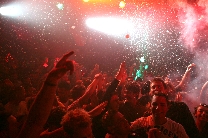Ghb Suspected In Vauxhall Disco Death
 Police in south London are warning clubbers to think very carefully about their own safety following the death of a 25 y/o man who took a ‘clubbing drug’ at the weekend.
Police in south London are warning clubbers to think very carefully about their own safety following the death of a 25 y/o man who took a ‘clubbing drug’ at the weekend.
The man felt unwell at a nightclub in Vauxhall in the early hours of Sunday 26 November and was taken home. The following morning, an ambulance was called when his friend found he was unconscious.
He died in a South London hospital yesterday, Tuesday 28 November. It is being treated as an unexplained death.
Detectives in Southwark and Lambeth are working together as they believe his death may be linked to five other collapses in nightclubs mainly used by gay people in the Vauxhall area over the weekend of 25/26 November.
DI Dave Willis of Southwark CID said: “We have been supporting the friends and family of the deceased and will do all we can to ascertain the circumstances surrounding his death.
“At this stage, we believe he fell ill after using either GHB (Gamma hydroxy butyrate) or GBL (Gamma butyrolactone) both of which are increasingly popular on the gay club scene and are frequently referred to as “G”.
“Friends have told us that during the evening, the deceased man mentioned taking a combination of GHB/GBL and other “recreational” drugs. We await the results of a post mortem and toxicology tests.
“We do not necessarily set up an investigation unless somebody dies. But we do have a responsibility to advise the public when we believe their safety is at risk.”
Superintendent Alistair Sutherland from Kennington Police said: “There have been at least 15 known collapses and two deaths related to GHB/GBL in the Vauxhall/Southwark area within the past two months.
“This is a particularly dangerous drug that is causing misery on the gay scene in London. People are not aware of the potentially fatal reaction it can have on their bodies especially when mixed with other recreational drugs and alcohol. It is like playing Russian roulette with your life – with very short odds.
“That is why Southwark and Lambeth police are working with local club owners on a campaign: Keep GHB/GBL out of our clubs.”
Though it has yet to be proved, all the factors in this tragedy point to a GBL/GHB overdose- leaving the majority of us wondering what it will take for people to stop using this drug so irresponsibly.
Obviously, it seems that users aren’t going to stop glugging back this troublesome fluid, but it doesn’t seem too rude to ask, that if you are going to insist on doing it, at least do it at home.
Despite the fact that blindly masturbating in the middle of a nightclub isn’t a good look (most of the time), G users are putting added pressure on licensees, bar staff, security and medics.
Psychologically, one has to question the stability of those who persist in abusing the drug. In many ways, it’s a chemical suicide. The loss of inhibition often leads to unsafe sex (in this way, it’s similar to crystal) and for a number of users, this is a bonus- it allows guilt free barebacking.
Where drunks wake up feeling remorse, G casualties seem to spring up and repeat the pattern, like bug-eyed, randy zombies in a gay horror film.
Undoubtedly there’s a huge element of self-loathing and low self esteem which fuels G useage- why else would somebody willing put themselves at risk of HIV, other STDs and a possible stretcher to the hospital?
Oh, because it feels good? Please. It doesn’t feel that good, and yes, I do know, I wouldn’t be pontificating if I hadn’t been there myself.
No high is worth a terminal condition or death, and even if your shrivelled self-esteem seems to believe it is worth ‘living in the moment’- can you at least stop inflicting this on those who don’t deserve the extra work?
Local Police LGBT (Lesbian, Gay, Bisexual & Transgendered) Liaison Officers have been working in partnership with the Terrence Higgins Trust and local Drug and Alcohol Action Teams over the past three years to highlight the dangers of taking and mixing recreational drugs.
Also, due to growing concerns about the numbers of collapses attributed to both forms of “G”, the Toxicology Unit at St Thomas’ Hospital has initiated a project with local nightclubs. This work, which is ongoing, aims to ensure a consistent standard of medical care for customers if they become unwell in clubs.
